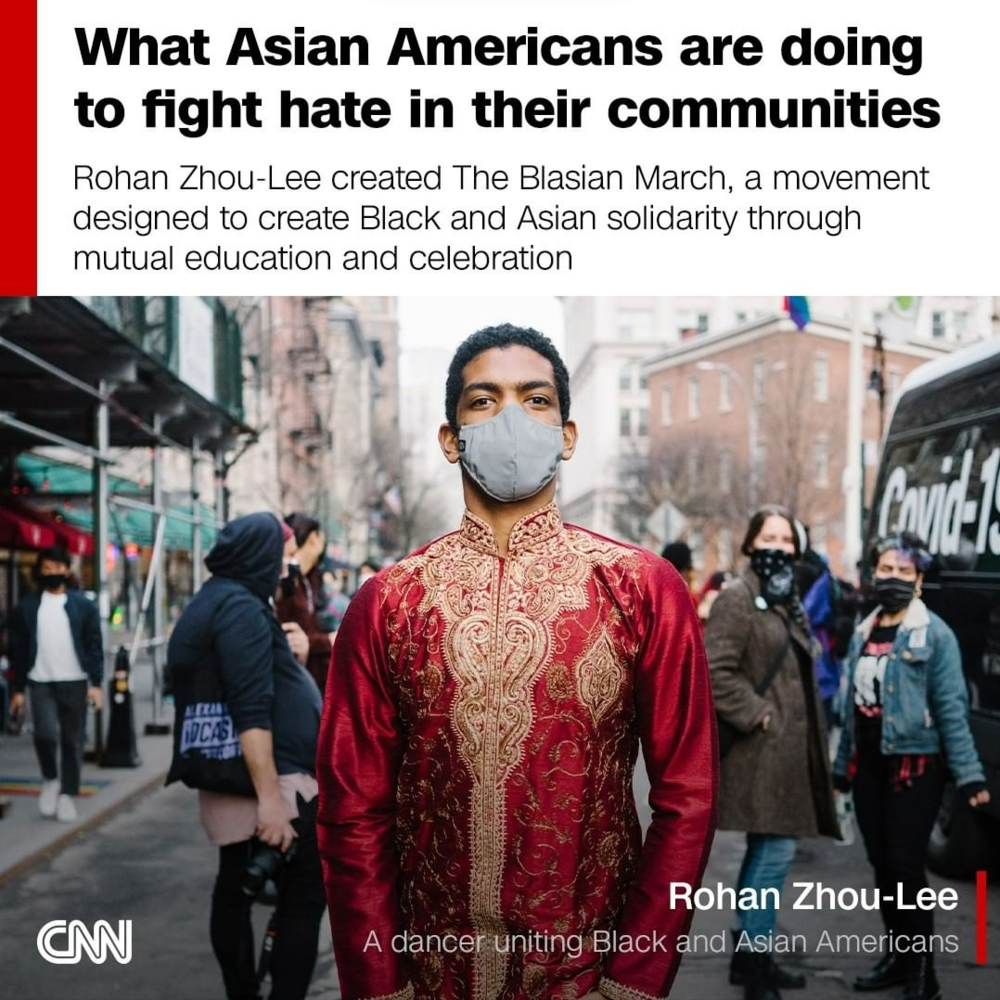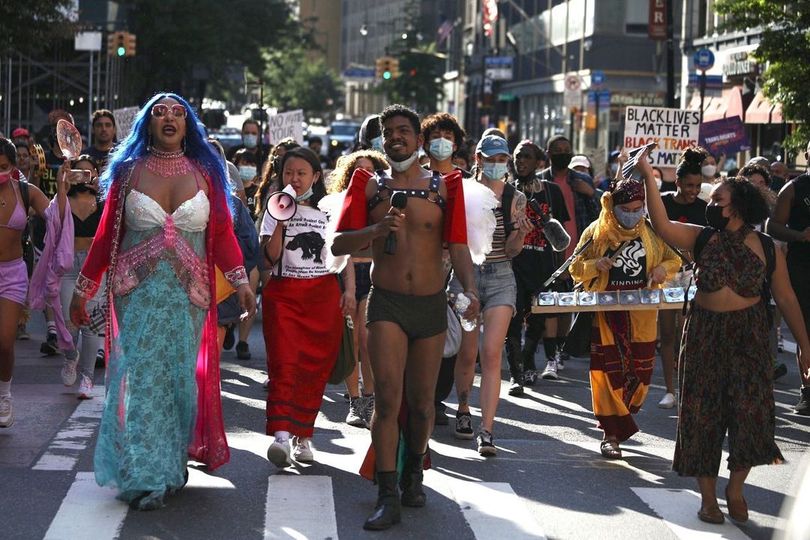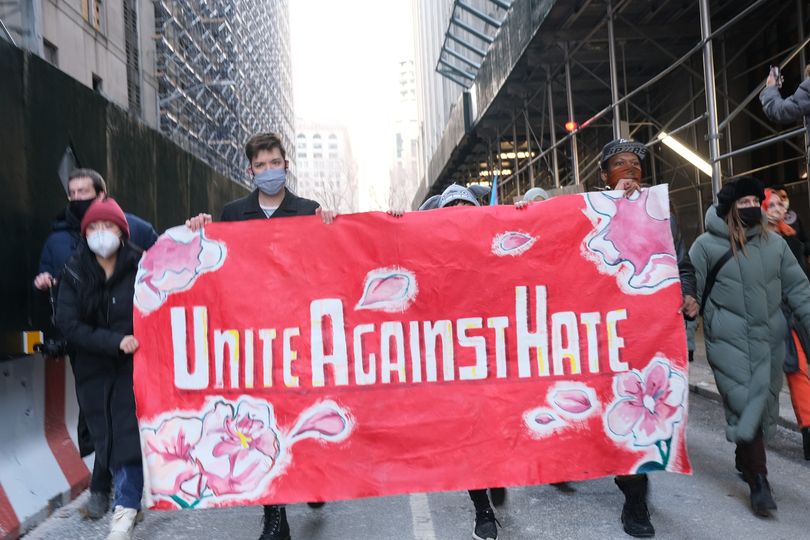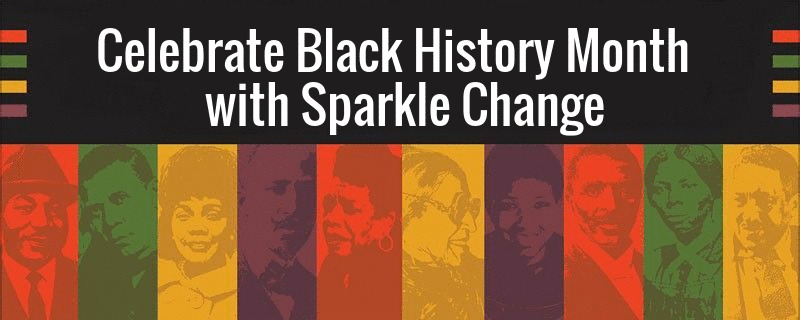By Brittany Chiu
An exclusive with Rohan-Zhou Lee.
Rohan Zhou-Lee, pronouns They/Siya/祂 (Tā), is a Queer/Non-Binary (gender Firebird) Black Asian author, dancer, and organizer in New York City. Zhou-Lee is the founder of the Blasian March, an initiative to build solidarity between Black, Asian and Blasian communities through education and celebration.
Zhou-Lee is also a dancer, trumpeter, and writer of poetry, essays, and Afro-Asian fantasy.
They can be contacted and booked for speaking engagements at: https://www.diaryofafirebird.com/
Learn more about Blasian March here: https://www.blasianmarch.org/

An Instagram post from CNN News that says What Asian Americans are doing to fight hate in their communities. Rohan Zhou-Lee created the Blasian March, a movement designed to create Black and Asian solidarity through mutual education and celebration. Zhou-Lee is wearing a red and gold kurta with a silver mask by Southpaw Stitches. Photo credit: Cindy Trinh.
What does Blasian mean to you?
Blasian can mean a lot of things. Personally, at face value, it’s someone who’s mixed Black and Asian, but from the political standpoint, Blasian is a call for unity. There’s political weight to it and even implies political defiance against how the colonial state, otherwise known as white supremacy, tries to keep Black and Asian communities separate.
I think about Christian Hall, a Chinese adoptee, who was killed by the police in 2020. I listened to a podcast called Banh Mi Chronicles and in the interview with Hall’s parents, they mentioned that Hall referred to himself as Blasian, which I thought was cute because his adoptive father is Black and Latino while his mother is Filipina. I thought that was a wonderful use of the term Blasian, which normally is used to describe racially mixed people.
Do you have any tips for Blasian children struggling with their identity?
Eat a lot of your cultural food. That was important for me growing up. My family’s Jamaican, so everyone is Blasian. It’s crucial for parents to root their kids from the beginning, to let their children know that they should be proud of who they are and where they came from. It’s okay to have ancestors who look nothing like you are right now. It’s also okay to have role models who don’t look like you or have the same experience as you do, and they can even be monoracial. Never apologize for your ancestry. Ancestors have survived, done so much, and given you life. It’s important to honor that.
How did Blasian March get started?
It started in 2020 during the pandemic lockdown in New York, but I would first give a shoutout to my Chicago organizing roots. I was more of an activist in Chicago than I am a community organizer, as I am now, and I was involved in several queer Asian community groups such as Trikone and Invisible 2 Invincible and a Filipino activist collective known as Anakbayan. I especially appreciated seeing Anakbayan and how they would often show solidarity for other communities.
After I had moved to New York City, I found out that there were offshoots of the Black Lives Matter movement—Black Women’s March, Black Disabled Lives Matter, and The Stonewall Riots for the Black LGBTQ+ community. During that time, I was trying to raise awareness of Black Lives Matter and organize a solidarity movement in the Asian communities; unfortunately, I experienced moments of anti-Blackness and queerphobia. As a healing process, I decided to create a march of Black Asian solidarity and also in emulation of what’s happening in the social environment, create space for Black and Asian people to explicitly be in solidarity.
In Asian communities, there exist a lot of Asians for Black Lives and they work in the background, addressing anti-Blackness in their communities and fostering dialogue. It’s great work, but from my observation, they were invisible. When Black Lives leaders thanked their other activist peers such as white peoples and Latinx folks for allyship, Asians were not acknowledged enough for their efforts even though they were a critical segment of the movement. Blasian March can help to counter the invisibilization of Asian organizers in the movement space.
What are some challenges that you faced in raising awareness of the Blasian March and building solidarity among communities?
The biggest challenge is that a lot of the more well-known organizers were not ready to acknowledge Black Asians as part of the community. In a way, they were not a political entity beyond acknowledgment by the general public that Blasians exist. When people find out that you’re Chinese, their response might be, “Oh you’re Chinese. That’s so cool.” However, nobody wants to hear your story about being a Black Chinese. Blasians are taken at face value. There is Kamala Harris, but what about others? What does it mean politically to be a Blasian? Some of the less supportive Asian activists have told me, “Blasian March is a niche concept. No one will show up,” but I don’t care what they say and I will do it anyway.
Another challenge is that one of Blasian March’s core values centers on women, the disabled, and LGBTQ+ rights and pride. At that time in New York City, a lot of the Asian activist leaders were straight men. They’re always welcome to join Blasian March, but I prioritize Asian speakers of other identities—women, disabled, or queer. I want to uplift them because they’re so invisiblized within their communities and political space. Blasian March is a platform solely for them to voice out. This pushes us into a corner. In 2021 when we organized a rally for the Asian community regarding rising hate crimes and Asian violence, although our protest got covered by international news and smaller outlets, we didn’t get covered by U.S. mainstream media. I sometimes wonder if it was because our leadership was all women and myself. None of us got any real recognition for organizing this.

Black, Asian and Blasian people marching for pride. Photo credit @jrobertson.nyc
Are there any inspirational figures that you look up to?
Most of them are women and historical. I like Gabriela Silang, who was one of the early rebels against the Spanish colonization of the Philippines. Her story about resistance resonates powerfully with me. I also look up to Fanny Lou Hamer who was a Black woman in the Civil Rights era and a disability rights advocate. I believe she’s getting more attention now, which she deserves.
Writers that I like are Octavia Butler, a sci-fi lesbian writer and one of the pioneers of Afrofuturism, Grace Lee Boggs, Kiyoshi Kuromiya, who was an openly gay activist during the Civil Rights Era, marched on Selma, and later became an HIV/AIDS activist., and N.K. Jemisin.
How did you come to approach Blasian March through the use of education and books?
Apart from myself being a writer and my love for reading, I came to a junction where I had asked myself, “What brings us joy? What can help continue conversations? What can help with healing?” In my personal life, a lot of my healing process from the impacts of racism and colonization had been through reading books. Carlos Bulosan’s America Is in the Heart was so pivotal in becoming an activist. I got that book right when the Black Lives Matter Movement started after I had graduated from college. I had previously participated in a few protests when I was in college, but college was its bubble and I was ready to step into the real world. College was also when I discovered that I was part Filipino. It was a time when I had begun to investigate my Filipino roots and learned to incorporate that into my identity. Carlos Bulosan’s book talks a lot about the racial violence that Filipino immigrants faced, including lynching. If my Black and Asian ancestors had similar experiences and acts of resistance against racism, why am I sitting here and afraid to go to a protest?
That’s why I think education is so critical for the Blasian March. Giving out books or creating booklists can not only help people navigate colonialist trauma but also help build bridges to other communities. Bridges already exist, but we’ve been conditioned by the system not to engage with those bridges. That became also a point of accessibility. Not everybody wants to come to a protest, so how can we gather people and meet up in a way that’s much more inclusive? The answer was books. We now host book fairs and hand out free books written by Black, Asian, and Blasian authors. We also hand out books from Indigenous writers because we live on stolen land and this is our way of acting in solidarity with the Indigenous communities. In fact, one of our Blasian March speakers is mixed Chinese, Filipino, and Ottawan.
It’s Black History Month. Do you have any fresh perspectives on that?
I think we’re almost afraid to talk about modern history. Modern history combats structures of privilege or imagined privilege. As much as I hate the Asian model minority myth, some of the privileges that come with it, although they’re false, do translate to Asians distancing themselves from Black people. That means not acknowledging and engaging with the long history of Black Asian solidarity. It ironically compromises those privileges.
I believe that the Asian model minority myth was constructed specifically to isolate Asians from Blacks since a lot of Asian activists were collaborating with Black activists during the Civil Rights Movement. It was a term coined by the New York Times in a 1966 article entitled “Success Story, Japanese American Style”. It’s not just racism, but class struggle also plays into the discomfort of not wanting to discuss this intersectional history. There are so many parallels between our communities that are not being taught about. If we want to fully engage in this Black Asian solidarity history, it does open the door to how far we may lose privilege within the class structure of the model minority myth status.

A series of people holding up a banner that reads Unite Against Hate. It’s red with cherry blossoms. Photo by @katiegodowski_photography and banner by @sketch_93 from the End The Violence Towards Asians, co-led by Blasian March and a team of women of color, Feb 20 2021.
How do you go about raising awareness in Asian communities who are less aware or completely unaware of Black Asian solidarity?
Again, education in history is key. Recently for Filipino American History Month, Blasian March conducted a town hall meeting where we had a Black Filipino panel. I also gave a presentation on Black Filipino solidarity history which goes way back to the 1800s. As a Blasian, I tend to lean more toward hypervisibilization. Within the Asian community, we always talk about how invisible we and our stories are. We Blasians are even more invisibilized. We are invisibilized in Asian communities because of the color of our skin. Even in the Black community, we are forced to assimilate into a singular narrative.
Either way leaves no room for Blasians. It’s as if we have to hide our Asian identity. I’ve met so many Blasians who had struggled to come out and admit that they’re Asian. It’s so sad and painful. One of my Blasian March organizers who is Indo-Carribean and Guyanese had told me after three years of knowing her that she is part Asian Indian. Asian Americans have this shame of being Asian and likewise, we Blasians are shamed for being Blasian. For us, it’s easier to not even bring up our Asian identity at all. I always make sure that I am hyperinvisibilized and that everyone knows I’m Asian. I look Black and I am Black, but if I’m wearing my Chinese hanfu or Filipino barong, it’s very much a suspension of those boundaries taught to us by white supremacy. It’s a defiance of that shame and invisibilization in a way that brings about more questions and invites dialogue.
I prescribe all this to my Caribbean roots. I was raised in a family where I was taught to be proud of my Chinese side and this was normal for me. We even celebrate Lunar New Year. I grew up in Georgia, and my family was heavily involved in the National Association of Chinese Americans. I also attribute this to my Black roots because Blacks are proud of their ancestry. When you combine these cultures and you’re so marginalized at the same time, there’s no passing privilege left to lose.
What’s your view on Florida banning AP African American History?
It’s fascinating because there’s Florida’s House Bill 287 waiting to be passed, which implements AAPI studies in schools. This highlights how dangerous face value politics is. The act of the government striking down African American history and then considering AAPI history pits Black and Asian communities against each other. It’s the whole model minority issue again. Claire Jean Kim’s racial triangulation applies here. The hopeful part of me wants to say that this is white supremacy’s last stand. I hate the term white supremacy; I prefer colonial state. I think the colonial state went into panic mode after Obama had been elected; hence, the rise in extremism and far-right politics. I do think this is the colonial state’s last and desperate attempt to cling to power and that power is reliant on minorities not knowing who they are. Not knowing who we are is because we don’t know our history. That’s why they are trying their best to ensure that history is not taught at schools. We are seeing the fall of structures of colonial power and the risings of communities of color taking the lead in all areas, especially politics.
Do you have any upcoming events or initiatives planned for Blasian March? How can people participate?
We’ll be doing another book fair, both physical and virtual, on April 29th in New York City’s Chinatown and this time, we’ll try to have more copies per book. Activities also include speaker sessions, performance hours with Black and Asian artists, book reading, and coloring pages for children.
Blasian March is a grassroots organization, so we will always welcome any support available. To learn more, you can visit our website at https:/www.blasianmarch.org. If you would like to bring the book fair to your city, we are more than happy to collaborate and organize that. We will also have our annual Pride rally in New York City on June 10th, and the key issue that we will focus on is environmental justice. Another rally that we will host is in Washington D.C. where we will advocate for affirmative action.

